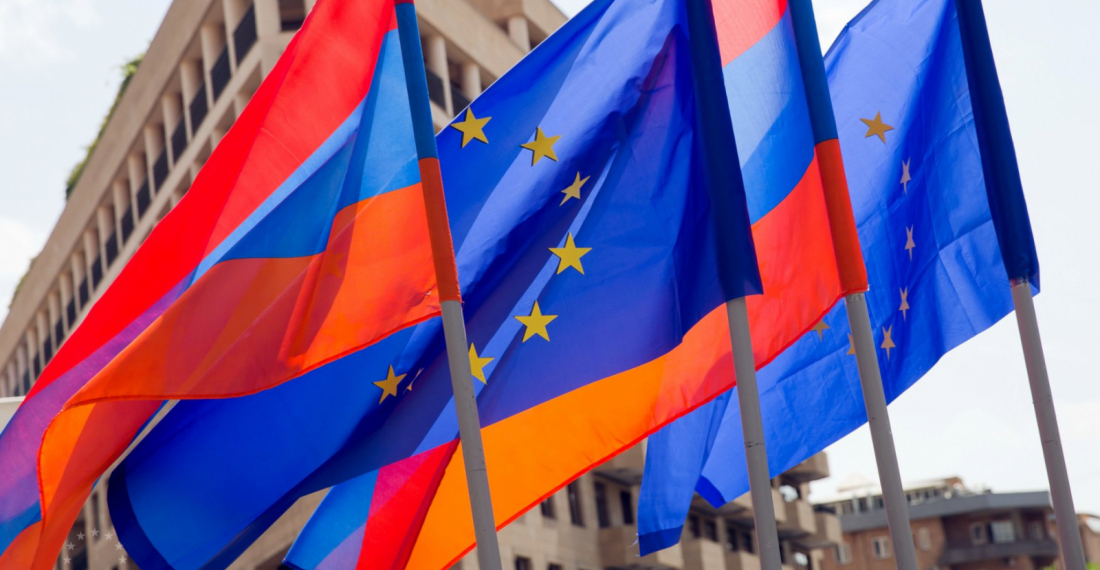"The EU is neither willing nor capable of countering Russia or Turkey in Armenia and Azerbaijan" and "will not make efforts to decrease Russian influence in Armenia and the unrecognised Nagorno Karabakh Republic", argues Benyamin Poghosyan in this op-ed.
EU-Armenia relations entered a new phase in 2009 when the EU launched its Eastern Partnership Initiative. Armenia successfully negotiated an Association Agreement with the EU and was going to sign it in autumn 2013. The growing tensions between Russia and the West forced Armenia to cancel the signature, not to ruin relations with its strategic ally. Armenia and the EU started a new round of negotiations in late 2014, culminating with the signature of the Comprehensive and Enhanced Partnership Agreement (CEPA) in November 2017.
The "2018 Velvet revolution" raised hopes that Armenia may further develop its relations with Brussels. Nevertheless, Yerevan was not ready to restart the negotiations on Association Agreement, and the EU had no intention to increase its support to Armenia beyond CEPA significantly. The Ukraine crisis, internal tensions due to the BREXIT, refugee issues, and tensions in EU-US relations after the election of President Trump put the South Caucasus on the margins of the European foreign policy priorities. In the region, the EU’s attention was mainly directed to Georgia, which signed an Association Agreement in 2014. The EU, alongside the US, participated in the resolution of the Georgian domestic political crisis in March 2020. The deployment of the EU Monitoring Mission in Georgia after the 2008 Russia - Georgia war was another channel to bring the EU closer to Georgia. CEPA provisionally entered into force in June 2018, pending ratification by the EU member states, and EU-Armenia relations appeared to go into a routine mode.
The 2020 Karabakh war has significantly changed the status quo in the region. The EU did not participate in the Karabakh negotiations process, where the US, Russia, and France took the lead as Minsk Group Co-chairs. Several times, Azerbaijan hinted that it would like to replace France with the EU, but this idea received support neither from Armenia nor the Co-chair countries. During the 44-day war, the EU made several statements calling for a ceasefire, but with no concrete results. The war was eventually stopped with Russian mediation, probably agreed with Turkey. The war laid bare the limited capabilities of the EU to influence the situation in its neighbourhood significantly. The EU also suffered reputational losses in Armenia. Many Armenians strongly believed that the West in general and the EU would not allow authoritarian Azerbaijan and Turkey to attack democratic Armenia. Of course, no one in Armenia hoped for military intervention by the EU or member states. However, people thought that as a value-based organisation, the EU would criticise Azerbaijan for violations of international humanitarian law during the war, and call for the establishment of an international war crimes tribunal, as was in the case of the Former Yugoslavia.
After Russia, Armenia, and Azerbaijan signed the trilateral statement on 10 November 2020; the EU provided and continues to provide humanitarian assistance to Armenian refugees who left Karabakh and took shelter in Armenia. In late April 2021 the EU called for the release of Armenian POWs and other detained persons regardless of the circumstances of their detention. These steps will contribute to the formation of a more positive image of the EU in Armenia. Meanwhile, the 10 November statement has plunged Armenia into an acute political crisis. After months of ups and downs, Prime Minister Pashinyan resigned on 25 April, and snap parliamentary elections will take place in Armenia on 20 June 2021. The war increased Russian and Turkish influence in the region, and many in Armenia look forward to an increased US and EU involvement, hoping that it will strengthen Armenia’s positions.
However, the EU is neither willing nor capable of countering Russia or Turkey in Armenia and Azerbaijan. Brussels wants to continue implementing CEPA with Armenia, which fully entered into force on March 1, 2021, and supports Armenia in implementing the reforms envisaged by the agreement. The EU continues negotiation with Azerbaijan to sign a strategic partnership agreement and attaches significant emphasis to the "Southern Gas Corridor," which started to deliver 10 billion cubic meters of Azeri gas into Italy, Greece, and Bulgaria.
Georgia remains the key partner of the EU in the South Caucasus. The EU made significant efforts to bring to the end the recent political crisis there. The President of the European Council visited Georgia on 1 March 2021, and then appointed a personal envoy, Christian Danielsson, to mediate and solve the political crisis. Meanwhile, throughout five months of internal instability in Armenia – accompanied by protests, clashes with police, criminal investigations launched against several opposition figures, and the controversial statement of the General staff calling for Pashinyan's resignation – the EU kept a pretty low profile.
Most probably, the EU will continue to monitor the election campaign in Armenia and will send signals to the authorities that the "2018 Velvet revolution" does not provide them with a carte blanche, and they should make all efforts to secure free and fair elections, or face deterioration in Armenia–EU relations. However, the EU will restrict its involvement in Armenia within the framework of the CEPA, and will not make efforts to decrease Russian influence in Armenia and the unrecognised Nagorno Karabakh Republic.



